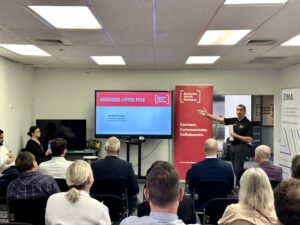It’s estimated that one in five New Zealanders will experience brain disease during their lifetime, and neurological conditions are among the most common causes of long-term disability.* And yet, for people living with the likes of Parkinson’s disease (PD), multiple sclerosis (MS), cerebral palsy, and the repercussions of stroke, there is only minimal physiotherapy rehab or support available.
Active+ Neuro in Rosedale Road aims to fill this crucial void, providing clients with essential tools and techniques to help protect their quality of life.
Clinic co-owner Steph Lane has run Active+ Physio in Don McKinnon Drive since 2016. She says that she’s immensely proud of the new neuro clinic, which is arguably unique in Aotearoa. “We’re the only clinic in the country to have a REX Bionics exoskeleton, a state-of-the-art robot. This enables clients with limited mobility or in a wheelchair to stand and move in all directions to complete robust rehabilitation programs. There are extensive benefits to strengthening the body up against gravity. The REX also improves spasticity [muscle tightness], range of movement, bladder and bowel function.”
The clinic supports patients of all ages; well-publicised cases, such as Michael J Fox’s early Parkinson’s diagnosis, have helped dispel the myth that neurological conditions only affect elderly or vulnerable people. “In addition to people in their thirties and forties living with an ongoing condition, we have a significant number of even younger clients, including rugby players, surfers and skateboarders who’re suffering the longer-term effects of concussion,” Steph confirms.
There are classes too, including PD Warrior and MS Head Start, internationally recognised neuro programmes, which are due to be further assessed by Harbour Sport in the near future.
During these sessions participants are seriously put through their paces, as neuro physiotherapist clinical lead Gilly Davy explains. “These are high intensity, evidence-based programmes that empower our clients. Cardiovascular training is an absolute game-changer. Science tells us that when we work at 80 per cent of our predicted heart rate max – the point where you’re really puffing and panting – we cause neurotrophins to be released. These are insulin-like growth proteins that promote synaptic activity, and it’s this synaptic activity that reduces axon dieback.
“When we talk about neurological protection, we don’t claim to be able to cure anything and we can’t promise to slow the condition’s progression. However, we can genuinely say that, through hard cardiovascular exercise, you will reduce the natural ageing dieback effect.”
As much as these classes are about physical health, Steph and Gilly agree that clients value other aspects too. “Having a sense of belonging within a supported group, socialising, sharing experiences, realising that they’re not alone with their challenges – this is how our clients help each other feel stronger, empowered, more confident,” says Steph. “I’m so proud of the team’s work here at the clinic, and our clients’ grit and gratitude blow me away.”
communityhealthSupportwellbeing





